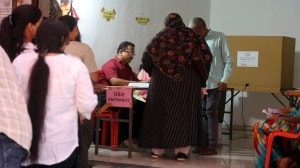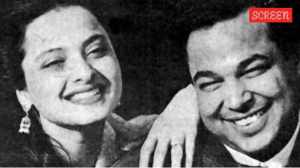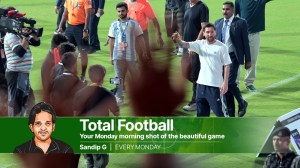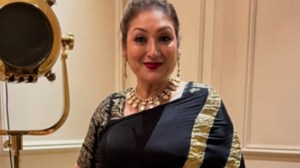Meet 2013 CBSE topper, IIT-Roorkee alumnus Sopan Khosla who works as an AI scientist at Amazon
“Graduate applications do not give much heed to school performance. So apart from temporary publicity and a good name for my hometown Jabalpur, I don’t think a lot changed long-term after my Class 12 board results,” says Sopan Khosla.
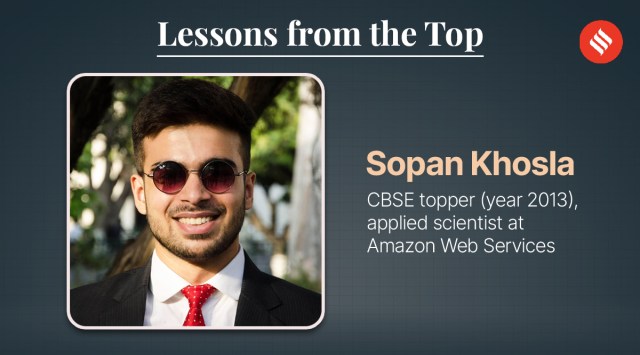 Sapan Khosla is a CBSE topper and IIT-Roorkee alumnus. (Graphics: Abhishek Mitra)
Sapan Khosla is a CBSE topper and IIT-Roorkee alumnus. (Graphics: Abhishek Mitra) (In our new series ‘Lessons from the Top‘, which we are starting in the run-up to the CBSE and ISC results expected next month, we will feature interviews with four toppers who graduated from high school a decade ago. Among them, one currently works as a scientist at Amazon in the US, another is a principal architect at Adobe in California, the third is a student at Harvard Law School, and the fourth is serving as an IAS officer and SDM of Prayagraj district in Uttar Pradesh. Over the next few days, they will share insights into their experiences with schooling, work, personal journeys, and life so far. You can find the rest of the articles here)
Sopan Khosla (26) topped the CBSE Class 12 Board examinations in 2013 with 99% in science. A student of Delhi Public School in Jabalpur, he pursued BTech (2013-17) at IIT Roorkee, where he was awarded the director’s gold medal for outstanding all-round achievement and a master’s degree (2019-21) from Carnegie Mellon University in the US. Khosla is an applied scientist at Amazon Web Services AI Labs in California.
Q. What’s the best thing about your work?
I get to work on what I love while impacting millions of users. Disentangling valuable signals from the ambiguity of communication has been a long-term interest of mine. A successful interaction, for example, a dialogue, is dependent on the mutual understanding of the world-models of all parties. As humans, when we talk to other humans, we take in subtleties beyond the mere set of symbols and sounds. We make assumptions that leverage common-sense, interpersonal relationships, and world knowledge to better understand the other person’s needs, intentions, and emotions.
In my job, I work towards building AI systems that can capture such hidden (semantic and pragmatic) signals from their conversations with customers. So, the systems can now better understand the customer’s goals, and help them take actions towards fulfilling those goals.
Q. What are the habits from school or college life that have stood you in good stead?
The major ones have been perseverance and discipline. Whether lifting heavier weights, learning a new sport, or doing research, these two have always been the make or break for me. People talk about talent as if it is an inherent ability to be good at something or that one can only be born with it. I would firmly push back on that and posit that like everything else, “talent” can be (and has to be) developed through discipline and perseverance.
Q. In hindsight, one thing you wish you had done differently in school or college or life?
I wish I had explicitly sought collaborations and contacts during my Masters at Carnegie Mellon University. I don’t know whether it was because of the Covid-19 pandemic, the remote classes, or just hesitation, but I should have approached more people during my tenure there.
It is astonishing how many doors that can open for you. While most of us might think that we are aiming to get into a top-tier undergrad college because they have good professors or great research facilities, or we would get to learn something about a subject not taught anywhere else in the country. Sorry, to burst the bubble, but most people (including myself) don’t remember much about the subjects they took in those four years, and most professors are not good teachers. That is just the sad truth. The biggest things I cherish from my undergrad days are the connections I made with other students. Some on an emotional level, some on an “admiration” level. Both of which have been equally important for me throughout. I wish I had done the same during my Master’s too, especially with people who have very similar expertise to mine.
Q. Could you talk about what helped you top the Board exam?
Extracurriculars and school. Yup, you saw it right the first time, School!! “Dekhiye padhai toh sab karte hain (Look, everybody studies)” is an infamous line from one of the interviews I gave (in my naivety, ofcourse) after the 12th board results.
In all seriousness, what helped me do well in boards and competitive exams were these outlets. There is just too much pressure! The society builds these great colleges with the promise of golden palaces and cars thereafter. So to get admissions into such esteemed institutions for two straight years, our teens do one thing and one thing only — study. Studying for five hours? How about increasing it to six? How about you study so much that you are solving Physics questions in your sleep?! This builds up so much tension.
Things like music and badminton gave me that escape I needed to crawl through those two years of continuous stress. School, for me, was a place to interact with friends and teachers, participate in events and ultimately take my mind off things.
Q. What doors opened for you after being a national ranker?
Honestly, not much. I went to IIT Roorkee for my undergrad. Its admission process does not consider board marks. Graduate applications give little heed to school performance. So apart from temporary publicity, a good name for Jabalpur, and occasional bullying, I don’t think a lot changed long-term after my Class 12 board results.
Q. How different are you from the young boy who topped the exam several years ago? Tell us how you have changed…
As compared to who I was in 2012-13, I think, I have come out of my shell a little bit. During that time, I was always worrying about the future. Having not done anything until then, I was unsure of myself. I didn’t really have any significant data points to build that self-belief.
Things have changed for the better, slowly, but still. I have more trust in myself when it comes to taking on hard challenges. I know that I can do anything I set my mind on. But maybe more importantly, the thought of failure, in general, does not have that crippling effect on me anymore. Along the way, I have been fortunate enough to have gathered memories and experiences that I can lean on to pull myself back up again.
Q. Looking back at your school education, with the benefit of hindsight, what is the one thing you think should change or improve?
Subjects that provide education about finance, investment, and commerce should be included in the curriculum regardless of the chosen stream.
- 01
- 02
- 03
- 04
- 05









